Contemporary Travel and Tourism Industry Report: Analysis and Trends
VerifiedAdded on 2023/02/02
|10
|3387
|63
Report
AI Summary
This report provides a comprehensive overview of the contemporary travel and tourism industry. It begins by discussing key historical developments, such as the emergence of travel agencies and advancements in transportation, and then explores the different elements within the industry, differentiating between direct and indirect elements and explaining their interrelation. The report then delves into factors affecting tourism behavior, including geographical, social, and cultural influences. It also examines models of motivation, such as physiological, safety, and self-actualization needs, and how these influence consumer decision-making processes. Finally, the report identifies recent and emerging patterns and trends in the international travel and tourism industry, including advancements in last-minute bookings and the impact of globalization on the sector.
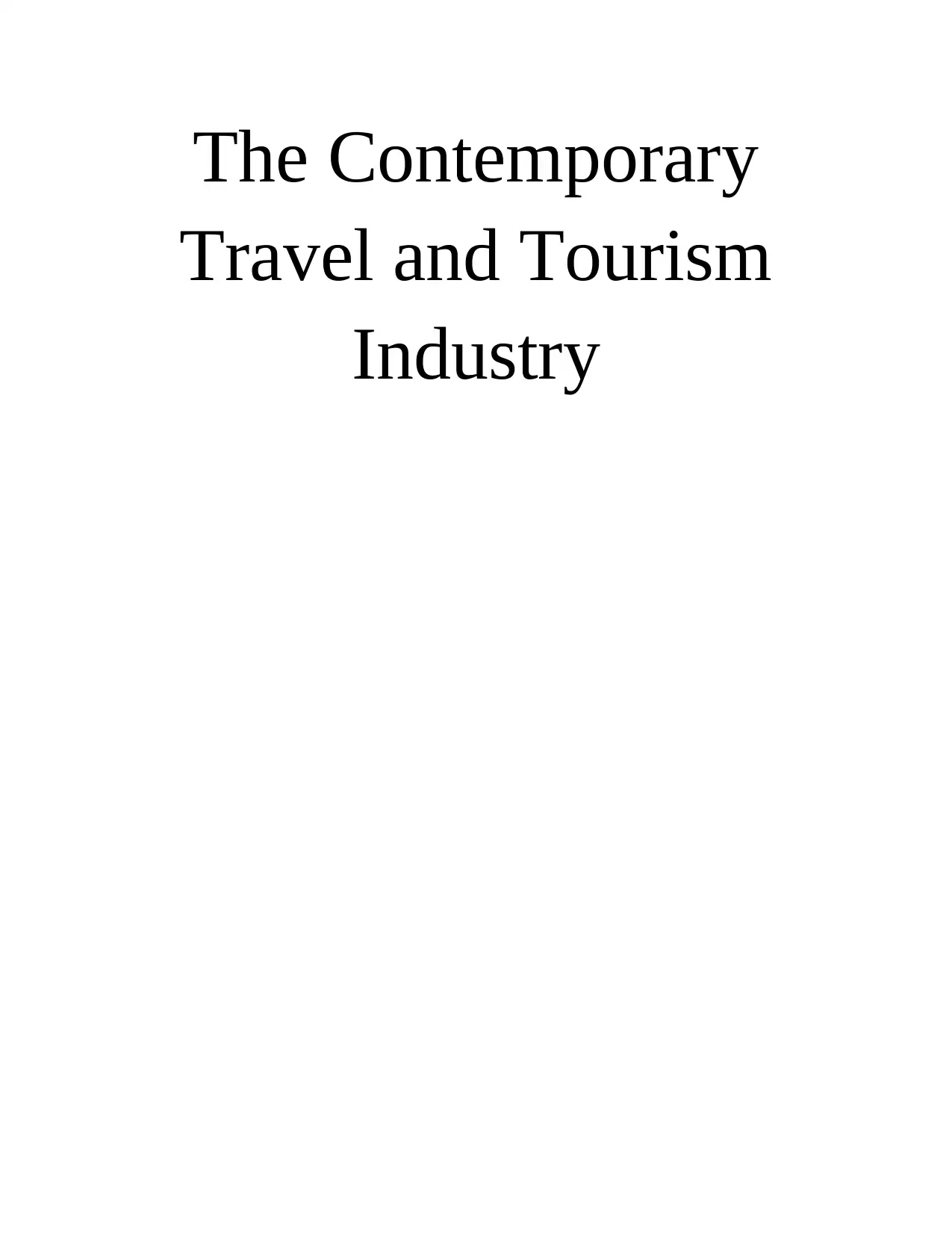
The Contemporary
Travel and Tourism
Industry
Travel and Tourism
Industry
Paraphrase This Document
Need a fresh take? Get an instant paraphrase of this document with our AI Paraphraser

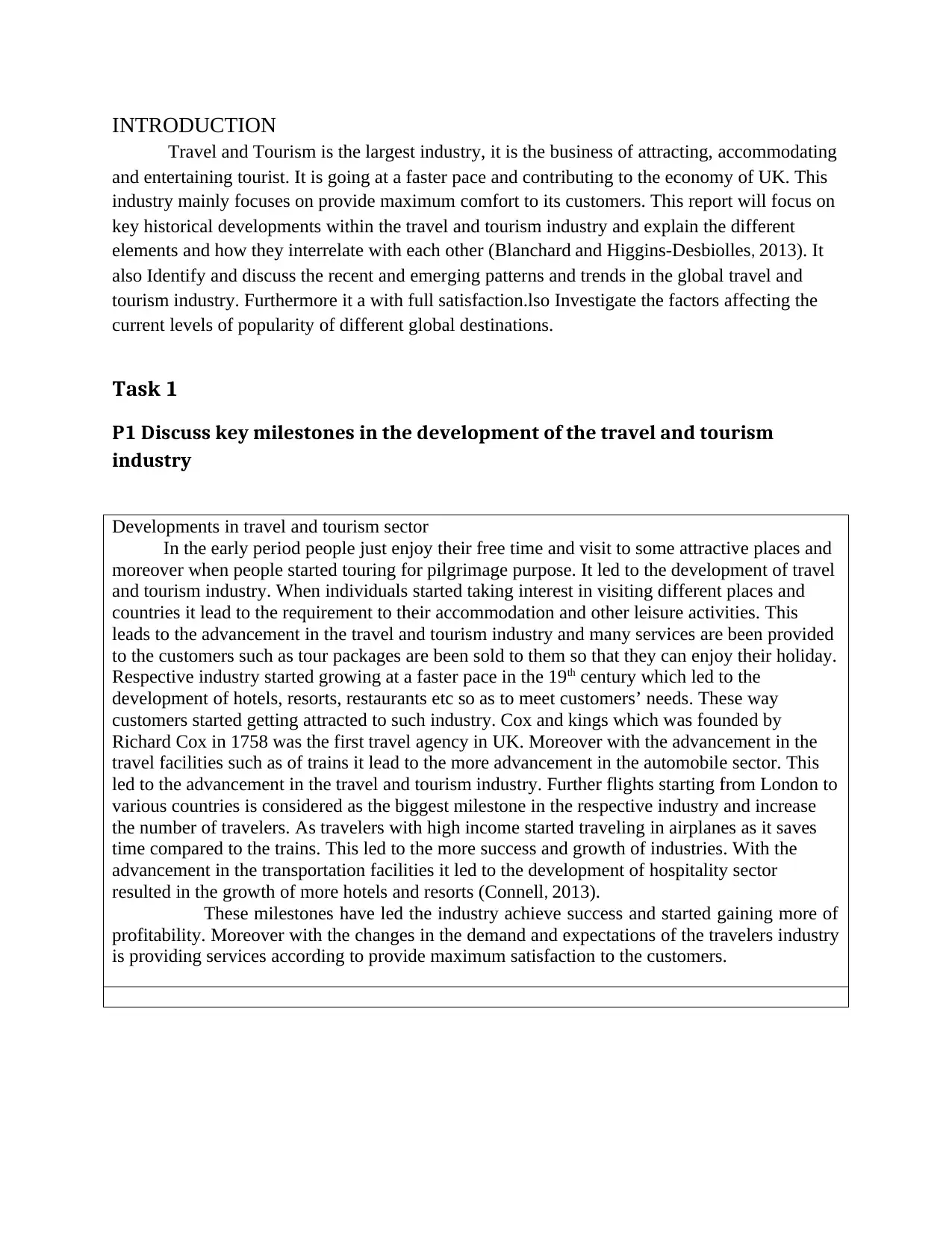
INTRODUCTION
Travel and Tourism is the largest industry, it is the business of attracting, accommodating
and entertaining tourist. It is going at a faster pace and contributing to the economy of UK. This
industry mainly focuses on provide maximum comfort to its customers. This report will focus on
key historical developments within the travel and tourism industry and explain the different
elements and how they interrelate with each other (Blanchard and Higgins-Desbiolles, 2013). It
also Identify and discuss the recent and emerging patterns and trends in the global travel and
tourism industry. Furthermore it a with full satisfaction.lso Investigate the factors affecting the
current levels of popularity of different global destinations.
Task 1
P1 Discuss key milestones in the development of the travel and tourism
industry
Developments in travel and tourism sector
In the early period people just enjoy their free time and visit to some attractive places and
moreover when people started touring for pilgrimage purpose. It led to the development of travel
and tourism industry. When individuals started taking interest in visiting different places and
countries it lead to the requirement to their accommodation and other leisure activities. This
leads to the advancement in the travel and tourism industry and many services are been provided
to the customers such as tour packages are been sold to them so that they can enjoy their holiday.
Respective industry started growing at a faster pace in the 19th century which led to the
development of hotels, resorts, restaurants etc so as to meet customers’ needs. These way
customers started getting attracted to such industry. Cox and kings which was founded by
Richard Cox in 1758 was the first travel agency in UK. Moreover with the advancement in the
travel facilities such as of trains it lead to the more advancement in the automobile sector. This
led to the advancement in the travel and tourism industry. Further flights starting from London to
various countries is considered as the biggest milestone in the respective industry and increase
the number of travelers. As travelers with high income started traveling in airplanes as it saves
time compared to the trains. This led to the more success and growth of industries. With the
advancement in the transportation facilities it led to the development of hospitality sector
resulted in the growth of more hotels and resorts (Connell, 2013).
These milestones have led the industry achieve success and started gaining more of
profitability. Moreover with the changes in the demand and expectations of the travelers industry
is providing services according to provide maximum satisfaction to the customers.
Travel and Tourism is the largest industry, it is the business of attracting, accommodating
and entertaining tourist. It is going at a faster pace and contributing to the economy of UK. This
industry mainly focuses on provide maximum comfort to its customers. This report will focus on
key historical developments within the travel and tourism industry and explain the different
elements and how they interrelate with each other (Blanchard and Higgins-Desbiolles, 2013). It
also Identify and discuss the recent and emerging patterns and trends in the global travel and
tourism industry. Furthermore it a with full satisfaction.lso Investigate the factors affecting the
current levels of popularity of different global destinations.
Task 1
P1 Discuss key milestones in the development of the travel and tourism
industry
Developments in travel and tourism sector
In the early period people just enjoy their free time and visit to some attractive places and
moreover when people started touring for pilgrimage purpose. It led to the development of travel
and tourism industry. When individuals started taking interest in visiting different places and
countries it lead to the requirement to their accommodation and other leisure activities. This
leads to the advancement in the travel and tourism industry and many services are been provided
to the customers such as tour packages are been sold to them so that they can enjoy their holiday.
Respective industry started growing at a faster pace in the 19th century which led to the
development of hotels, resorts, restaurants etc so as to meet customers’ needs. These way
customers started getting attracted to such industry. Cox and kings which was founded by
Richard Cox in 1758 was the first travel agency in UK. Moreover with the advancement in the
travel facilities such as of trains it lead to the more advancement in the automobile sector. This
led to the advancement in the travel and tourism industry. Further flights starting from London to
various countries is considered as the biggest milestone in the respective industry and increase
the number of travelers. As travelers with high income started traveling in airplanes as it saves
time compared to the trains. This led to the more success and growth of industries. With the
advancement in the transportation facilities it led to the development of hospitality sector
resulted in the growth of more hotels and resorts (Connell, 2013).
These milestones have led the industry achieve success and started gaining more of
profitability. Moreover with the changes in the demand and expectations of the travelers industry
is providing services according to provide maximum satisfaction to the customers.
⊘ This is a preview!⊘
Do you want full access?
Subscribe today to unlock all pages.

Trusted by 1+ million students worldwide
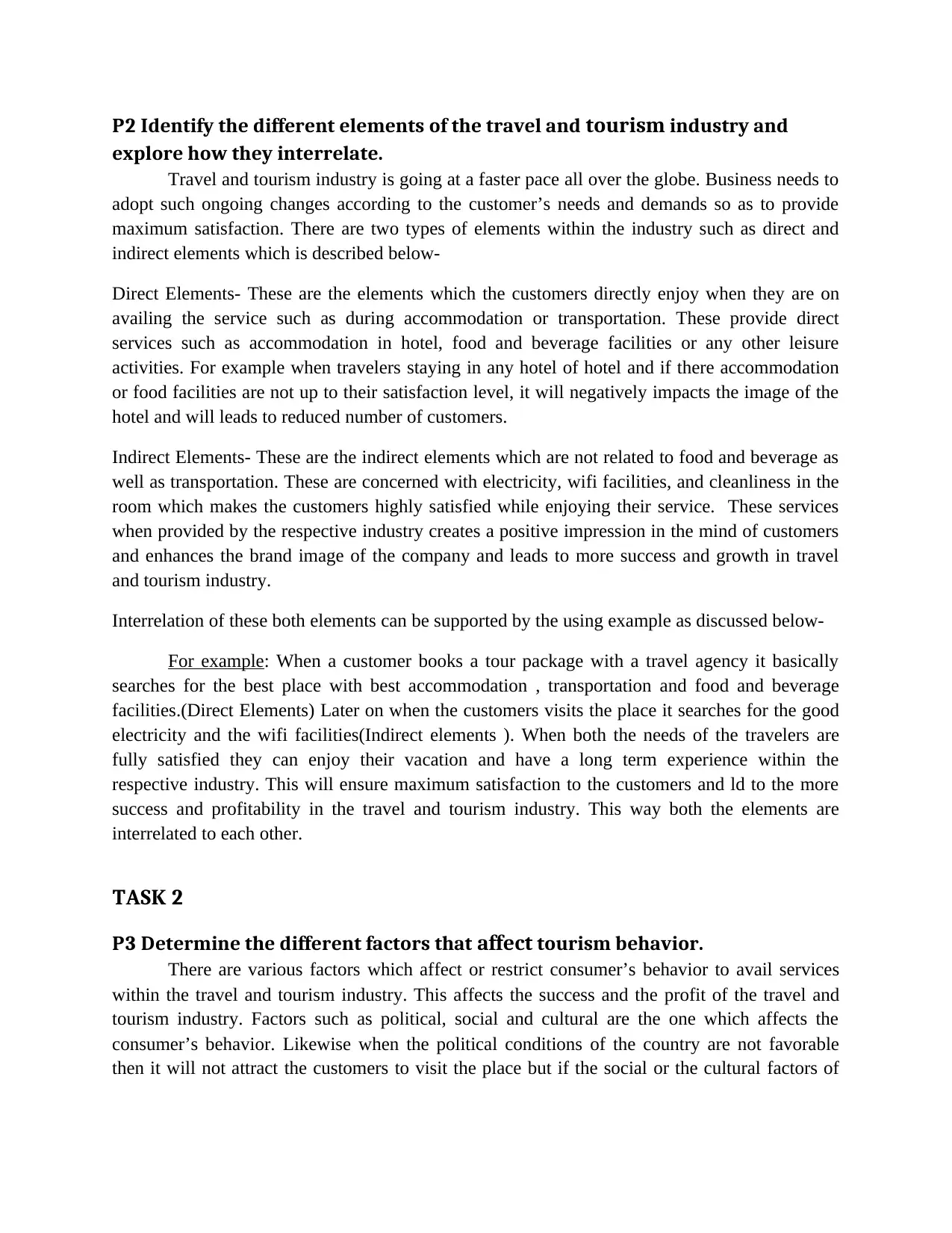
P2 Identify the different elements of the travel and tourism industry and
explore how they interrelate.
Travel and tourism industry is going at a faster pace all over the globe. Business needs to
adopt such ongoing changes according to the customer’s needs and demands so as to provide
maximum satisfaction. There are two types of elements within the industry such as direct and
indirect elements which is described below-
Direct Elements- These are the elements which the customers directly enjoy when they are on
availing the service such as during accommodation or transportation. These provide direct
services such as accommodation in hotel, food and beverage facilities or any other leisure
activities. For example when travelers staying in any hotel of hotel and if there accommodation
or food facilities are not up to their satisfaction level, it will negatively impacts the image of the
hotel and will leads to reduced number of customers.
Indirect Elements- These are the indirect elements which are not related to food and beverage as
well as transportation. These are concerned with electricity, wifi facilities, and cleanliness in the
room which makes the customers highly satisfied while enjoying their service. These services
when provided by the respective industry creates a positive impression in the mind of customers
and enhances the brand image of the company and leads to more success and growth in travel
and tourism industry.
Interrelation of these both elements can be supported by the using example as discussed below-
For example: When a customer books a tour package with a travel agency it basically
searches for the best place with best accommodation , transportation and food and beverage
facilities.(Direct Elements) Later on when the customers visits the place it searches for the good
electricity and the wifi facilities(Indirect elements ). When both the needs of the travelers are
fully satisfied they can enjoy their vacation and have a long term experience within the
respective industry. This will ensure maximum satisfaction to the customers and ld to the more
success and profitability in the travel and tourism industry. This way both the elements are
interrelated to each other.
TASK 2
P3 Determine the different factors that affect tourism behavior.
There are various factors which affect or restrict consumer’s behavior to avail services
within the travel and tourism industry. This affects the success and the profit of the travel and
tourism industry. Factors such as political, social and cultural are the one which affects the
consumer’s behavior. Likewise when the political conditions of the country are not favorable
then it will not attract the customers to visit the place but if the social or the cultural factors of
explore how they interrelate.
Travel and tourism industry is going at a faster pace all over the globe. Business needs to
adopt such ongoing changes according to the customer’s needs and demands so as to provide
maximum satisfaction. There are two types of elements within the industry such as direct and
indirect elements which is described below-
Direct Elements- These are the elements which the customers directly enjoy when they are on
availing the service such as during accommodation or transportation. These provide direct
services such as accommodation in hotel, food and beverage facilities or any other leisure
activities. For example when travelers staying in any hotel of hotel and if there accommodation
or food facilities are not up to their satisfaction level, it will negatively impacts the image of the
hotel and will leads to reduced number of customers.
Indirect Elements- These are the indirect elements which are not related to food and beverage as
well as transportation. These are concerned with electricity, wifi facilities, and cleanliness in the
room which makes the customers highly satisfied while enjoying their service. These services
when provided by the respective industry creates a positive impression in the mind of customers
and enhances the brand image of the company and leads to more success and growth in travel
and tourism industry.
Interrelation of these both elements can be supported by the using example as discussed below-
For example: When a customer books a tour package with a travel agency it basically
searches for the best place with best accommodation , transportation and food and beverage
facilities.(Direct Elements) Later on when the customers visits the place it searches for the good
electricity and the wifi facilities(Indirect elements ). When both the needs of the travelers are
fully satisfied they can enjoy their vacation and have a long term experience within the
respective industry. This will ensure maximum satisfaction to the customers and ld to the more
success and profitability in the travel and tourism industry. This way both the elements are
interrelated to each other.
TASK 2
P3 Determine the different factors that affect tourism behavior.
There are various factors which affect or restrict consumer’s behavior to avail services
within the travel and tourism industry. This affects the success and the profit of the travel and
tourism industry. Factors such as political, social and cultural are the one which affects the
consumer’s behavior. Likewise when the political conditions of the country are not favorable
then it will not attract the customers to visit the place but if the social or the cultural factors of
Paraphrase This Document
Need a fresh take? Get an instant paraphrase of this document with our AI Paraphraser
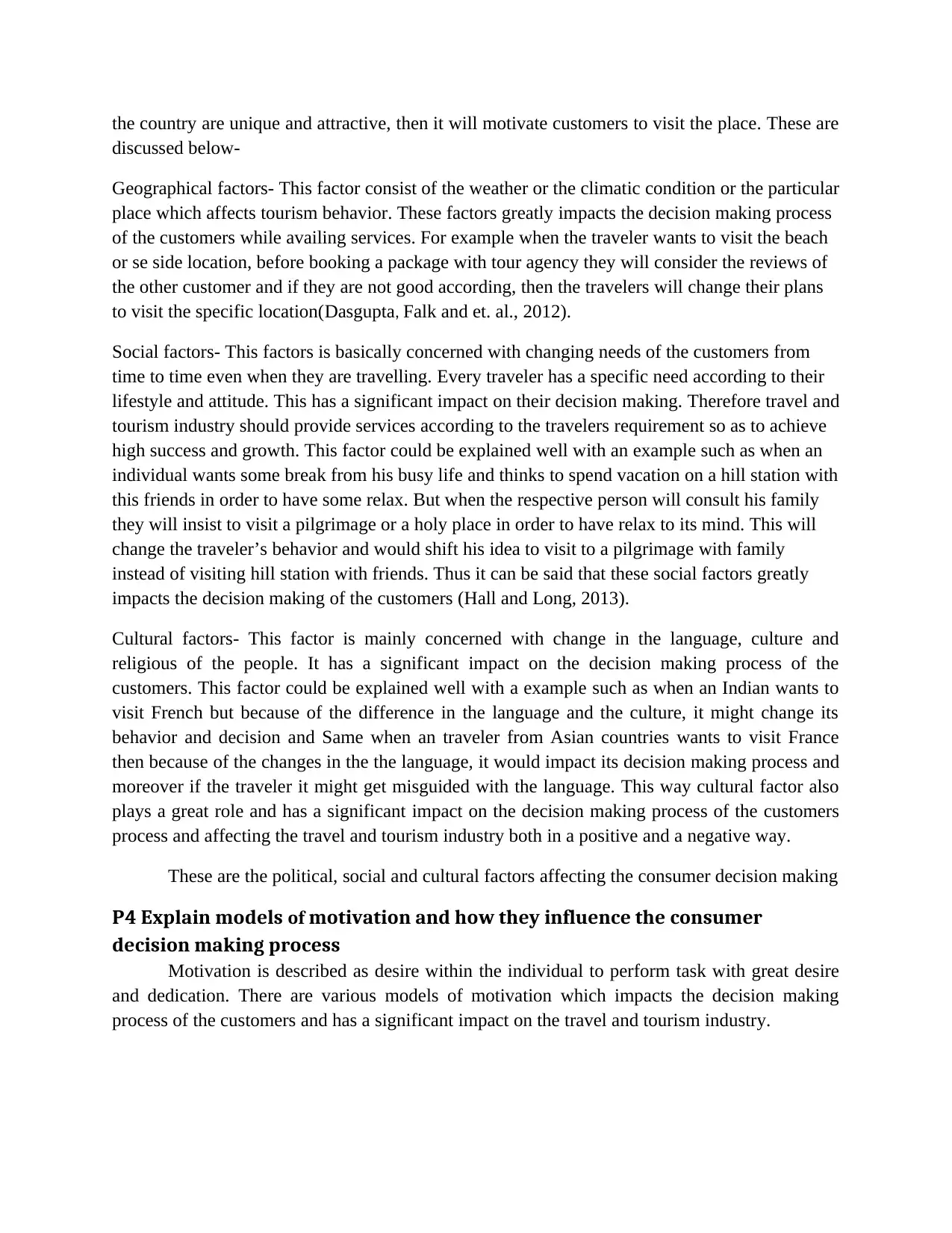
the country are unique and attractive, then it will motivate customers to visit the place. These are
discussed below-
Geographical factors- This factor consist of the weather or the climatic condition or the particular
place which affects tourism behavior. These factors greatly impacts the decision making process
of the customers while availing services. For example when the traveler wants to visit the beach
or se side location, before booking a package with tour agency they will consider the reviews of
the other customer and if they are not good according, then the travelers will change their plans
to visit the specific location(Dasgupta, Falk and et. al., 2012).
Social factors- This factors is basically concerned with changing needs of the customers from
time to time even when they are travelling. Every traveler has a specific need according to their
lifestyle and attitude. This has a significant impact on their decision making. Therefore travel and
tourism industry should provide services according to the travelers requirement so as to achieve
high success and growth. This factor could be explained well with an example such as when an
individual wants some break from his busy life and thinks to spend vacation on a hill station with
this friends in order to have some relax. But when the respective person will consult his family
they will insist to visit a pilgrimage or a holy place in order to have relax to its mind. This will
change the traveler’s behavior and would shift his idea to visit to a pilgrimage with family
instead of visiting hill station with friends. Thus it can be said that these social factors greatly
impacts the decision making of the customers (Hall and Long, 2013).
Cultural factors- This factor is mainly concerned with change in the language, culture and
religious of the people. It has a significant impact on the decision making process of the
customers. This factor could be explained well with a example such as when an Indian wants to
visit French but because of the difference in the language and the culture, it might change its
behavior and decision and Same when an traveler from Asian countries wants to visit France
then because of the changes in the the language, it would impact its decision making process and
moreover if the traveler it might get misguided with the language. This way cultural factor also
plays a great role and has a significant impact on the decision making process of the customers
process and affecting the travel and tourism industry both in a positive and a negative way.
These are the political, social and cultural factors affecting the consumer decision making
P4 Explain models of motivation and how they influence the consumer
decision making process
Motivation is described as desire within the individual to perform task with great desire
and dedication. There are various models of motivation which impacts the decision making
process of the customers and has a significant impact on the travel and tourism industry.
discussed below-
Geographical factors- This factor consist of the weather or the climatic condition or the particular
place which affects tourism behavior. These factors greatly impacts the decision making process
of the customers while availing services. For example when the traveler wants to visit the beach
or se side location, before booking a package with tour agency they will consider the reviews of
the other customer and if they are not good according, then the travelers will change their plans
to visit the specific location(Dasgupta, Falk and et. al., 2012).
Social factors- This factors is basically concerned with changing needs of the customers from
time to time even when they are travelling. Every traveler has a specific need according to their
lifestyle and attitude. This has a significant impact on their decision making. Therefore travel and
tourism industry should provide services according to the travelers requirement so as to achieve
high success and growth. This factor could be explained well with an example such as when an
individual wants some break from his busy life and thinks to spend vacation on a hill station with
this friends in order to have some relax. But when the respective person will consult his family
they will insist to visit a pilgrimage or a holy place in order to have relax to its mind. This will
change the traveler’s behavior and would shift his idea to visit to a pilgrimage with family
instead of visiting hill station with friends. Thus it can be said that these social factors greatly
impacts the decision making of the customers (Hall and Long, 2013).
Cultural factors- This factor is mainly concerned with change in the language, culture and
religious of the people. It has a significant impact on the decision making process of the
customers. This factor could be explained well with a example such as when an Indian wants to
visit French but because of the difference in the language and the culture, it might change its
behavior and decision and Same when an traveler from Asian countries wants to visit France
then because of the changes in the the language, it would impact its decision making process and
moreover if the traveler it might get misguided with the language. This way cultural factor also
plays a great role and has a significant impact on the decision making process of the customers
process and affecting the travel and tourism industry both in a positive and a negative way.
These are the political, social and cultural factors affecting the consumer decision making
P4 Explain models of motivation and how they influence the consumer
decision making process
Motivation is described as desire within the individual to perform task with great desire
and dedication. There are various models of motivation which impacts the decision making
process of the customers and has a significant impact on the travel and tourism industry.
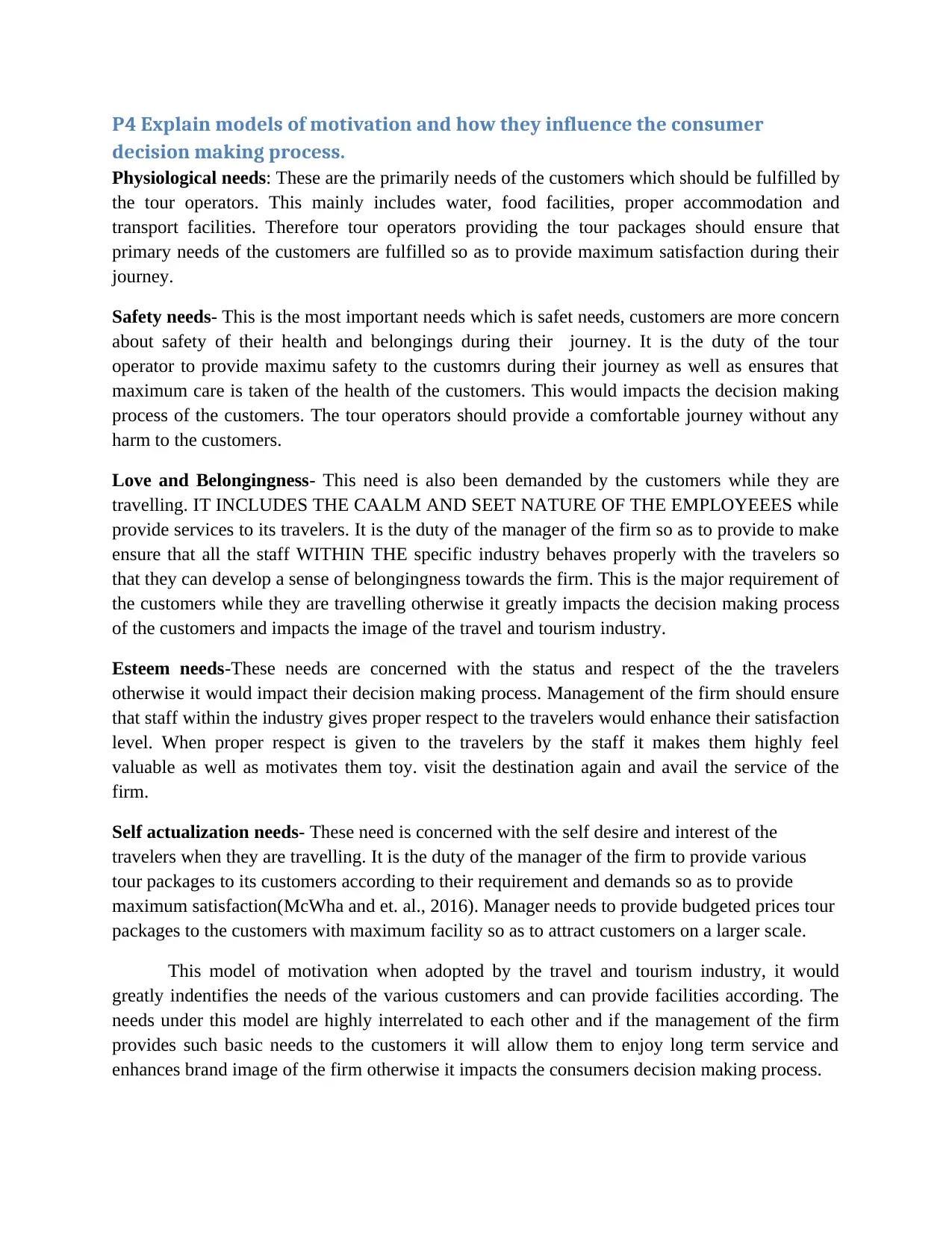
P4 Explain models of motivation and how they influence the consumer
decision making process.
Physiological needs: These are the primarily needs of the customers which should be fulfilled by
the tour operators. This mainly includes water, food facilities, proper accommodation and
transport facilities. Therefore tour operators providing the tour packages should ensure that
primary needs of the customers are fulfilled so as to provide maximum satisfaction during their
journey.
Safety needs- This is the most important needs which is safet needs, customers are more concern
about safety of their health and belongings during their journey. It is the duty of the tour
operator to provide maximu safety to the customrs during their journey as well as ensures that
maximum care is taken of the health of the customers. This would impacts the decision making
process of the customers. The tour operators should provide a comfortable journey without any
harm to the customers.
Love and Belongingness- This need is also been demanded by the customers while they are
travelling. IT INCLUDES THE CAALM AND SEET NATURE OF THE EMPLOYEEES while
provide services to its travelers. It is the duty of the manager of the firm so as to provide to make
ensure that all the staff WITHIN THE specific industry behaves properly with the travelers so
that they can develop a sense of belongingness towards the firm. This is the major requirement of
the customers while they are travelling otherwise it greatly impacts the decision making process
of the customers and impacts the image of the travel and tourism industry.
Esteem needs-These needs are concerned with the status and respect of the the travelers
otherwise it would impact their decision making process. Management of the firm should ensure
that staff within the industry gives proper respect to the travelers would enhance their satisfaction
level. When proper respect is given to the travelers by the staff it makes them highly feel
valuable as well as motivates them toy. visit the destination again and avail the service of the
firm.
Self actualization needs- These need is concerned with the self desire and interest of the
travelers when they are travelling. It is the duty of the manager of the firm to provide various
tour packages to its customers according to their requirement and demands so as to provide
maximum satisfaction(McWha and et. al., 2016). Manager needs to provide budgeted prices tour
packages to the customers with maximum facility so as to attract customers on a larger scale.
This model of motivation when adopted by the travel and tourism industry, it would
greatly indentifies the needs of the various customers and can provide facilities according. The
needs under this model are highly interrelated to each other and if the management of the firm
provides such basic needs to the customers it will allow them to enjoy long term service and
enhances brand image of the firm otherwise it impacts the consumers decision making process.
decision making process.
Physiological needs: These are the primarily needs of the customers which should be fulfilled by
the tour operators. This mainly includes water, food facilities, proper accommodation and
transport facilities. Therefore tour operators providing the tour packages should ensure that
primary needs of the customers are fulfilled so as to provide maximum satisfaction during their
journey.
Safety needs- This is the most important needs which is safet needs, customers are more concern
about safety of their health and belongings during their journey. It is the duty of the tour
operator to provide maximu safety to the customrs during their journey as well as ensures that
maximum care is taken of the health of the customers. This would impacts the decision making
process of the customers. The tour operators should provide a comfortable journey without any
harm to the customers.
Love and Belongingness- This need is also been demanded by the customers while they are
travelling. IT INCLUDES THE CAALM AND SEET NATURE OF THE EMPLOYEEES while
provide services to its travelers. It is the duty of the manager of the firm so as to provide to make
ensure that all the staff WITHIN THE specific industry behaves properly with the travelers so
that they can develop a sense of belongingness towards the firm. This is the major requirement of
the customers while they are travelling otherwise it greatly impacts the decision making process
of the customers and impacts the image of the travel and tourism industry.
Esteem needs-These needs are concerned with the status and respect of the the travelers
otherwise it would impact their decision making process. Management of the firm should ensure
that staff within the industry gives proper respect to the travelers would enhance their satisfaction
level. When proper respect is given to the travelers by the staff it makes them highly feel
valuable as well as motivates them toy. visit the destination again and avail the service of the
firm.
Self actualization needs- These need is concerned with the self desire and interest of the
travelers when they are travelling. It is the duty of the manager of the firm to provide various
tour packages to its customers according to their requirement and demands so as to provide
maximum satisfaction(McWha and et. al., 2016). Manager needs to provide budgeted prices tour
packages to the customers with maximum facility so as to attract customers on a larger scale.
This model of motivation when adopted by the travel and tourism industry, it would
greatly indentifies the needs of the various customers and can provide facilities according. The
needs under this model are highly interrelated to each other and if the management of the firm
provides such basic needs to the customers it will allow them to enjoy long term service and
enhances brand image of the firm otherwise it impacts the consumers decision making process.
⊘ This is a preview!⊘
Do you want full access?
Subscribe today to unlock all pages.

Trusted by 1+ million students worldwide
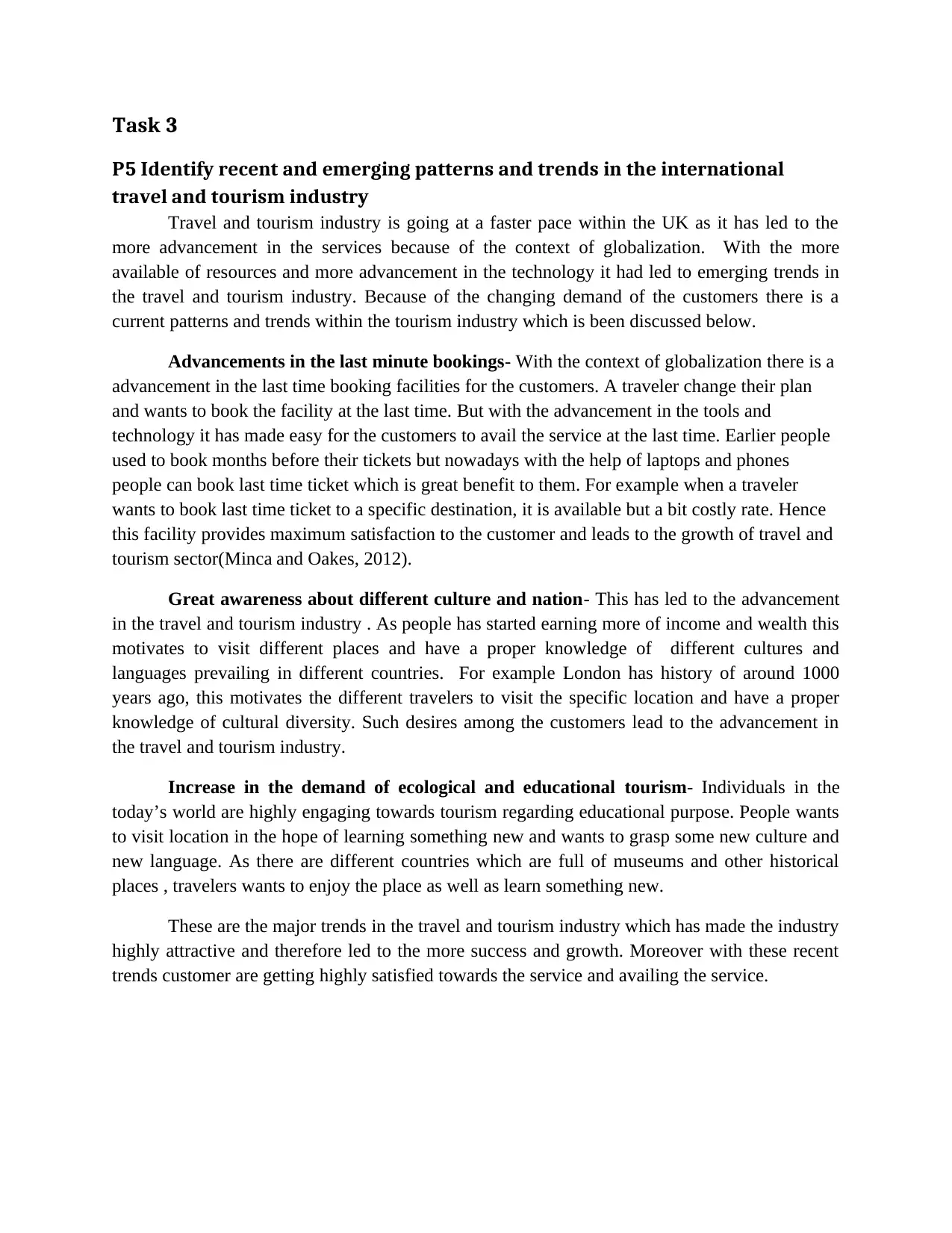
Task 3
P5 Identify recent and emerging patterns and trends in the international
travel and tourism industry
Travel and tourism industry is going at a faster pace within the UK as it has led to the
more advancement in the services because of the context of globalization. With the more
available of resources and more advancement in the technology it had led to emerging trends in
the travel and tourism industry. Because of the changing demand of the customers there is a
current patterns and trends within the tourism industry which is been discussed below.
Advancements in the last minute bookings- With the context of globalization there is a
advancement in the last time booking facilities for the customers. A traveler change their plan
and wants to book the facility at the last time. But with the advancement in the tools and
technology it has made easy for the customers to avail the service at the last time. Earlier people
used to book months before their tickets but nowadays with the help of laptops and phones
people can book last time ticket which is great benefit to them. For example when a traveler
wants to book last time ticket to a specific destination, it is available but a bit costly rate. Hence
this facility provides maximum satisfaction to the customer and leads to the growth of travel and
tourism sector(Minca and Oakes, 2012).
Great awareness about different culture and nation- This has led to the advancement
in the travel and tourism industry . As people has started earning more of income and wealth this
motivates to visit different places and have a proper knowledge of different cultures and
languages prevailing in different countries. For example London has history of around 1000
years ago, this motivates the different travelers to visit the specific location and have a proper
knowledge of cultural diversity. Such desires among the customers lead to the advancement in
the travel and tourism industry.
Increase in the demand of ecological and educational tourism- Individuals in the
today’s world are highly engaging towards tourism regarding educational purpose. People wants
to visit location in the hope of learning something new and wants to grasp some new culture and
new language. As there are different countries which are full of museums and other historical
places , travelers wants to enjoy the place as well as learn something new.
These are the major trends in the travel and tourism industry which has made the industry
highly attractive and therefore led to the more success and growth. Moreover with these recent
trends customer are getting highly satisfied towards the service and availing the service.
P5 Identify recent and emerging patterns and trends in the international
travel and tourism industry
Travel and tourism industry is going at a faster pace within the UK as it has led to the
more advancement in the services because of the context of globalization. With the more
available of resources and more advancement in the technology it had led to emerging trends in
the travel and tourism industry. Because of the changing demand of the customers there is a
current patterns and trends within the tourism industry which is been discussed below.
Advancements in the last minute bookings- With the context of globalization there is a
advancement in the last time booking facilities for the customers. A traveler change their plan
and wants to book the facility at the last time. But with the advancement in the tools and
technology it has made easy for the customers to avail the service at the last time. Earlier people
used to book months before their tickets but nowadays with the help of laptops and phones
people can book last time ticket which is great benefit to them. For example when a traveler
wants to book last time ticket to a specific destination, it is available but a bit costly rate. Hence
this facility provides maximum satisfaction to the customer and leads to the growth of travel and
tourism sector(Minca and Oakes, 2012).
Great awareness about different culture and nation- This has led to the advancement
in the travel and tourism industry . As people has started earning more of income and wealth this
motivates to visit different places and have a proper knowledge of different cultures and
languages prevailing in different countries. For example London has history of around 1000
years ago, this motivates the different travelers to visit the specific location and have a proper
knowledge of cultural diversity. Such desires among the customers lead to the advancement in
the travel and tourism industry.
Increase in the demand of ecological and educational tourism- Individuals in the
today’s world are highly engaging towards tourism regarding educational purpose. People wants
to visit location in the hope of learning something new and wants to grasp some new culture and
new language. As there are different countries which are full of museums and other historical
places , travelers wants to enjoy the place as well as learn something new.
These are the major trends in the travel and tourism industry which has made the industry
highly attractive and therefore led to the more success and growth. Moreover with these recent
trends customer are getting highly satisfied towards the service and availing the service.
Paraphrase This Document
Need a fresh take? Get an instant paraphrase of this document with our AI Paraphraser
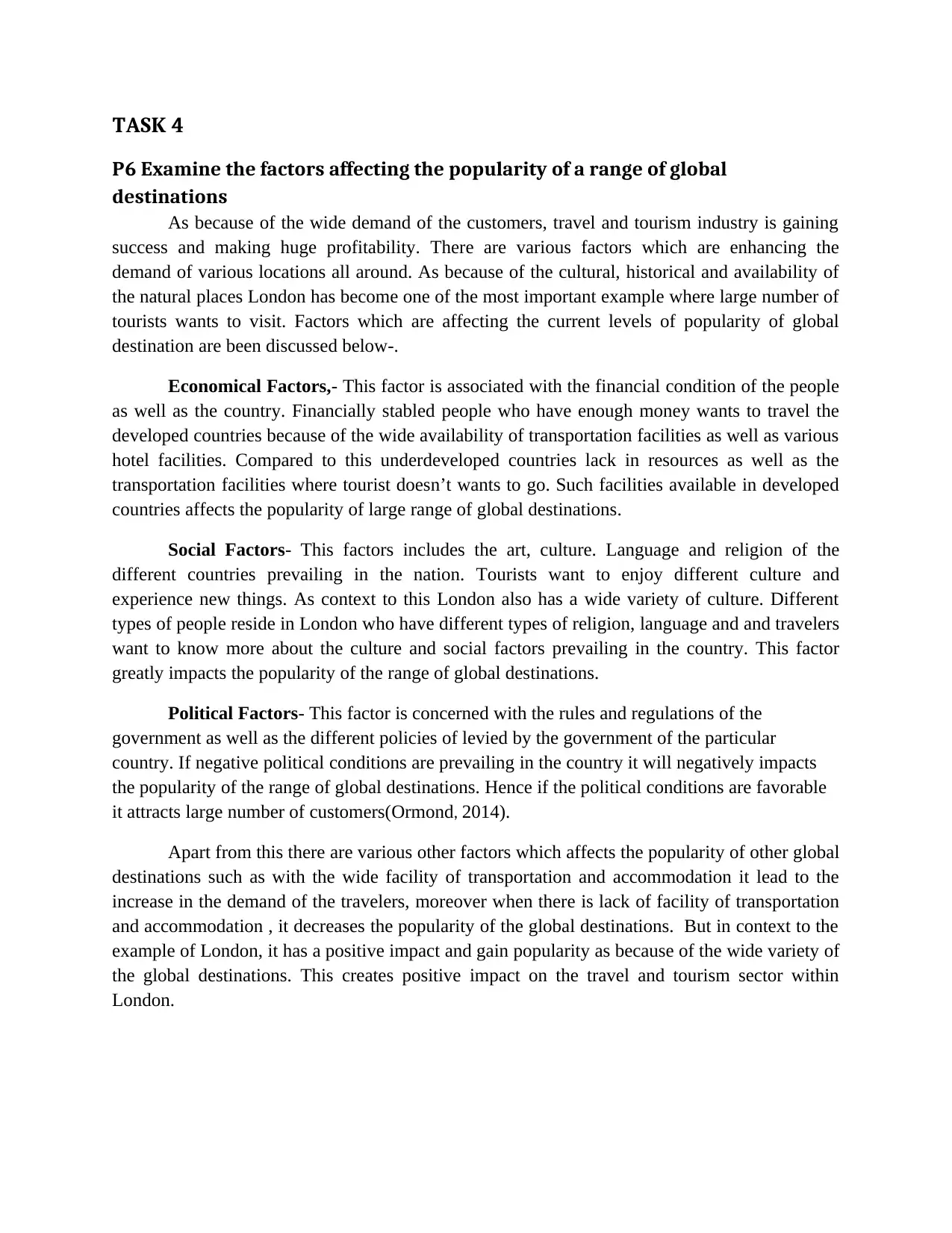
TASK 4
P6 Examine the factors affecting the popularity of a range of global
destinations
As because of the wide demand of the customers, travel and tourism industry is gaining
success and making huge profitability. There are various factors which are enhancing the
demand of various locations all around. As because of the cultural, historical and availability of
the natural places London has become one of the most important example where large number of
tourists wants to visit. Factors which are affecting the current levels of popularity of global
destination are been discussed below-.
Economical Factors,- This factor is associated with the financial condition of the people
as well as the country. Financially stabled people who have enough money wants to travel the
developed countries because of the wide availability of transportation facilities as well as various
hotel facilities. Compared to this underdeveloped countries lack in resources as well as the
transportation facilities where tourist doesn’t wants to go. Such facilities available in developed
countries affects the popularity of large range of global destinations.
Social Factors- This factors includes the art, culture. Language and religion of the
different countries prevailing in the nation. Tourists want to enjoy different culture and
experience new things. As context to this London also has a wide variety of culture. Different
types of people reside in London who have different types of religion, language and and travelers
want to know more about the culture and social factors prevailing in the country. This factor
greatly impacts the popularity of the range of global destinations.
Political Factors- This factor is concerned with the rules and regulations of the
government as well as the different policies of levied by the government of the particular
country. If negative political conditions are prevailing in the country it will negatively impacts
the popularity of the range of global destinations. Hence if the political conditions are favorable
it attracts large number of customers(Ormond, 2014).
Apart from this there are various other factors which affects the popularity of other global
destinations such as with the wide facility of transportation and accommodation it lead to the
increase in the demand of the travelers, moreover when there is lack of facility of transportation
and accommodation , it decreases the popularity of the global destinations. But in context to the
example of London, it has a positive impact and gain popularity as because of the wide variety of
the global destinations. This creates positive impact on the travel and tourism sector within
London.
P6 Examine the factors affecting the popularity of a range of global
destinations
As because of the wide demand of the customers, travel and tourism industry is gaining
success and making huge profitability. There are various factors which are enhancing the
demand of various locations all around. As because of the cultural, historical and availability of
the natural places London has become one of the most important example where large number of
tourists wants to visit. Factors which are affecting the current levels of popularity of global
destination are been discussed below-.
Economical Factors,- This factor is associated with the financial condition of the people
as well as the country. Financially stabled people who have enough money wants to travel the
developed countries because of the wide availability of transportation facilities as well as various
hotel facilities. Compared to this underdeveloped countries lack in resources as well as the
transportation facilities where tourist doesn’t wants to go. Such facilities available in developed
countries affects the popularity of large range of global destinations.
Social Factors- This factors includes the art, culture. Language and religion of the
different countries prevailing in the nation. Tourists want to enjoy different culture and
experience new things. As context to this London also has a wide variety of culture. Different
types of people reside in London who have different types of religion, language and and travelers
want to know more about the culture and social factors prevailing in the country. This factor
greatly impacts the popularity of the range of global destinations.
Political Factors- This factor is concerned with the rules and regulations of the
government as well as the different policies of levied by the government of the particular
country. If negative political conditions are prevailing in the country it will negatively impacts
the popularity of the range of global destinations. Hence if the political conditions are favorable
it attracts large number of customers(Ormond, 2014).
Apart from this there are various other factors which affects the popularity of other global
destinations such as with the wide facility of transportation and accommodation it lead to the
increase in the demand of the travelers, moreover when there is lack of facility of transportation
and accommodation , it decreases the popularity of the global destinations. But in context to the
example of London, it has a positive impact and gain popularity as because of the wide variety of
the global destinations. This creates positive impact on the travel and tourism sector within
London.
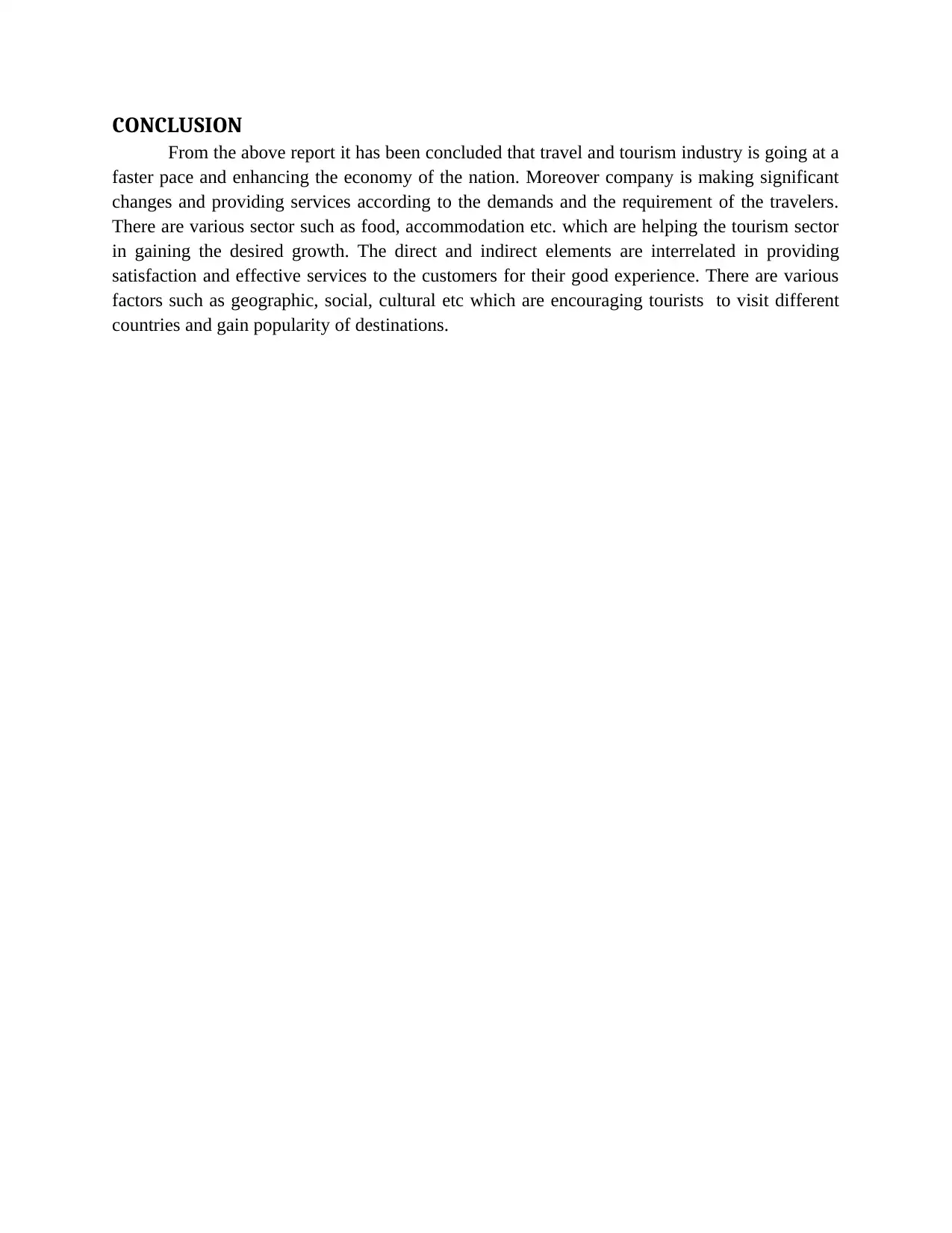
CONCLUSION
From the above report it has been concluded that travel and tourism industry is going at a
faster pace and enhancing the economy of the nation. Moreover company is making significant
changes and providing services according to the demands and the requirement of the travelers.
There are various sector such as food, accommodation etc. which are helping the tourism sector
in gaining the desired growth. The direct and indirect elements are interrelated in providing
satisfaction and effective services to the customers for their good experience. There are various
factors such as geographic, social, cultural etc which are encouraging tourists to visit different
countries and gain popularity of destinations.
From the above report it has been concluded that travel and tourism industry is going at a
faster pace and enhancing the economy of the nation. Moreover company is making significant
changes and providing services according to the demands and the requirement of the travelers.
There are various sector such as food, accommodation etc. which are helping the tourism sector
in gaining the desired growth. The direct and indirect elements are interrelated in providing
satisfaction and effective services to the customers for their good experience. There are various
factors such as geographic, social, cultural etc which are encouraging tourists to visit different
countries and gain popularity of destinations.
⊘ This is a preview!⊘
Do you want full access?
Subscribe today to unlock all pages.

Trusted by 1+ million students worldwide
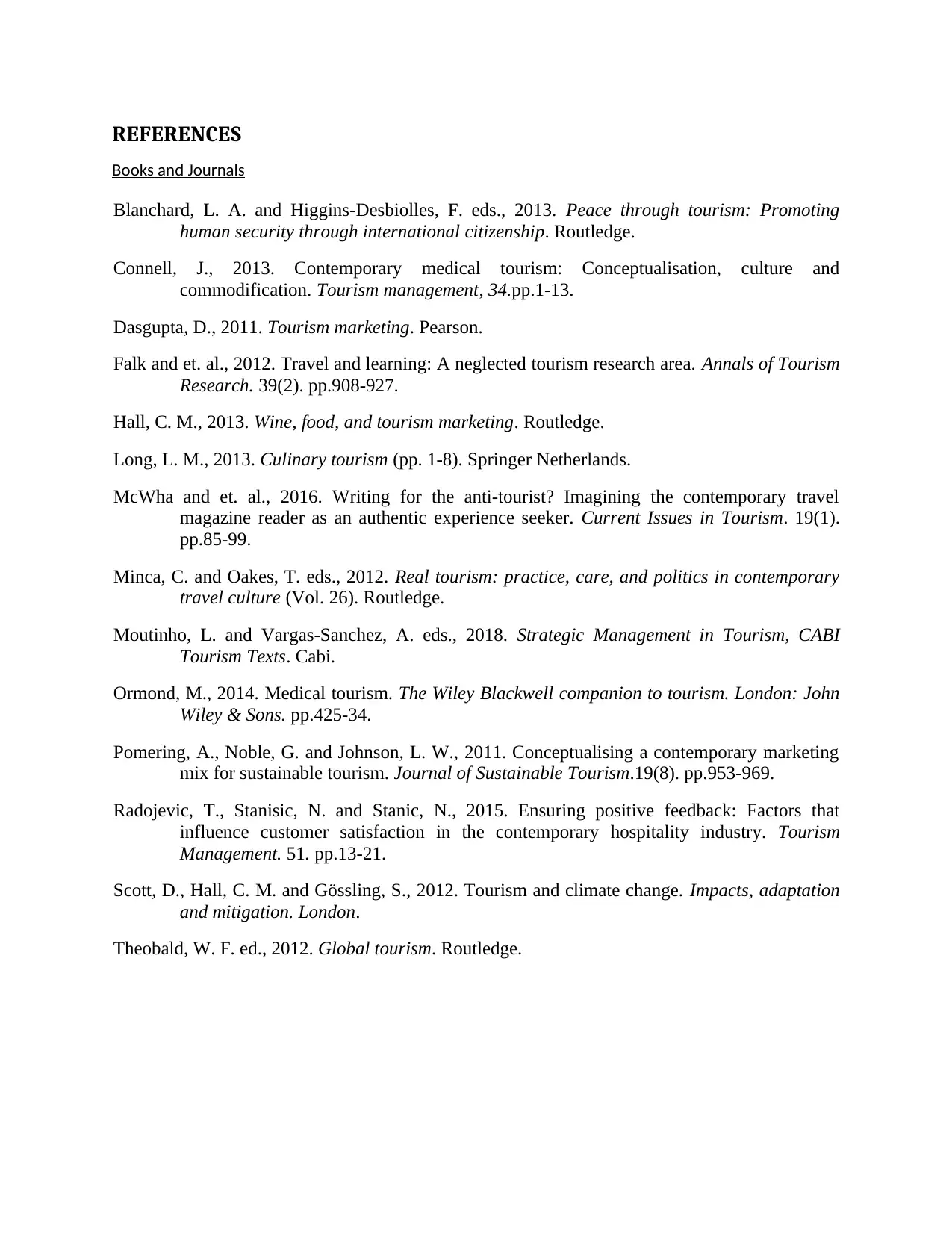
REFERENCES
Books and Journals
Blanchard, L. A. and Higgins-Desbiolles, F. eds., 2013. Peace through tourism: Promoting
human security through international citizenship. Routledge.
Connell, J., 2013. Contemporary medical tourism: Conceptualisation, culture and
commodification. Tourism management, 34.pp.1-13.
Dasgupta, D., 2011. Tourism marketing. Pearson.
Falk and et. al., 2012. Travel and learning: A neglected tourism research area. Annals of Tourism
Research. 39(2). pp.908-927.
Hall, C. M., 2013. Wine, food, and tourism marketing. Routledge.
Long, L. M., 2013. Culinary tourism (pp. 1-8). Springer Netherlands.
McWha and et. al., 2016. Writing for the anti-tourist? Imagining the contemporary travel
magazine reader as an authentic experience seeker. Current Issues in Tourism. 19(1).
pp.85-99.
Minca, C. and Oakes, T. eds., 2012. Real tourism: practice, care, and politics in contemporary
travel culture (Vol. 26). Routledge.
Moutinho, L. and Vargas-Sanchez, A. eds., 2018. Strategic Management in Tourism, CABI
Tourism Texts. Cabi.
Ormond, M., 2014. Medical tourism. The Wiley Blackwell companion to tourism. London: John
Wiley & Sons. pp.425-34.
Pomering, A., Noble, G. and Johnson, L. W., 2011. Conceptualising a contemporary marketing
mix for sustainable tourism. Journal of Sustainable Tourism.19(8). pp.953-969.
Radojevic, T., Stanisic, N. and Stanic, N., 2015. Ensuring positive feedback: Factors that
influence customer satisfaction in the contemporary hospitality industry. Tourism
Management. 51. pp.13-21.
Scott, D., Hall, C. M. and Gössling, S., 2012. Tourism and climate change. Impacts, adaptation
and mitigation. London.
Theobald, W. F. ed., 2012. Global tourism. Routledge.
Books and Journals
Blanchard, L. A. and Higgins-Desbiolles, F. eds., 2013. Peace through tourism: Promoting
human security through international citizenship. Routledge.
Connell, J., 2013. Contemporary medical tourism: Conceptualisation, culture and
commodification. Tourism management, 34.pp.1-13.
Dasgupta, D., 2011. Tourism marketing. Pearson.
Falk and et. al., 2012. Travel and learning: A neglected tourism research area. Annals of Tourism
Research. 39(2). pp.908-927.
Hall, C. M., 2013. Wine, food, and tourism marketing. Routledge.
Long, L. M., 2013. Culinary tourism (pp. 1-8). Springer Netherlands.
McWha and et. al., 2016. Writing for the anti-tourist? Imagining the contemporary travel
magazine reader as an authentic experience seeker. Current Issues in Tourism. 19(1).
pp.85-99.
Minca, C. and Oakes, T. eds., 2012. Real tourism: practice, care, and politics in contemporary
travel culture (Vol. 26). Routledge.
Moutinho, L. and Vargas-Sanchez, A. eds., 2018. Strategic Management in Tourism, CABI
Tourism Texts. Cabi.
Ormond, M., 2014. Medical tourism. The Wiley Blackwell companion to tourism. London: John
Wiley & Sons. pp.425-34.
Pomering, A., Noble, G. and Johnson, L. W., 2011. Conceptualising a contemporary marketing
mix for sustainable tourism. Journal of Sustainable Tourism.19(8). pp.953-969.
Radojevic, T., Stanisic, N. and Stanic, N., 2015. Ensuring positive feedback: Factors that
influence customer satisfaction in the contemporary hospitality industry. Tourism
Management. 51. pp.13-21.
Scott, D., Hall, C. M. and Gössling, S., 2012. Tourism and climate change. Impacts, adaptation
and mitigation. London.
Theobald, W. F. ed., 2012. Global tourism. Routledge.
1 out of 10
Related Documents
Your All-in-One AI-Powered Toolkit for Academic Success.
+13062052269
info@desklib.com
Available 24*7 on WhatsApp / Email
![[object Object]](/_next/static/media/star-bottom.7253800d.svg)
Unlock your academic potential
Copyright © 2020–2026 A2Z Services. All Rights Reserved. Developed and managed by ZUCOL.



